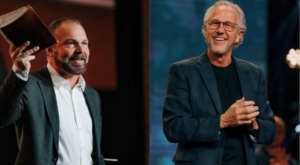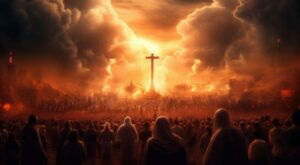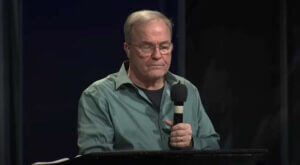Stacey Irvine ate almost nothing but chicken nuggets for 15 years. She never tasted fruits or vegetables. She occasionally supplemented her diet with French fries. One day her tongue started to swell and she couldn’t catch her breath. She was rushed to the hospital, her airway was forced open, and they stuck an IV in her arm to start pumping in the nutrients she needed. After saving her life, the medical staff sent her home, but not before they warned her that she needed to change her diet or prepare herself for an early death.
I’ve heard people call it a famine. A famine of knowing the Bible. During a famine people waste away for lack of sustenance. Some people die. Those who remain need nourishment; they need to be revived. And if they have any hope of remaining alive over time, their life situation has to change in conspicuous ways.
During normal famines people don’t have access to the food they need. But Stacey Irvine could have eaten anything she wanted. She had resources, opportunity and presumably all the encouragement she needed to eat well. Can you imagine what would happen if all of us decided to follow her example and discontinued eating all but non-nutritious foodstuff? If we happened to beat the odds and live, we undoubtedly would suffer in the long run from nutrition-related chronic illnesses such as diabetes and heart disease.
Like Stacey Irvine, we’re killing ourselves. It’s surely not for lack of resources; nevertheless, we are in fact starving ourselves to death.
Christians used to be known as “people of one book.” Sure, they read, studied and shared other books. But the book they cared about more than all others combined was the Bible. They memorized it, meditated on it, talked about it and taught it to others. We don’t do that anymore, and in a very real sense we’re starving ourselves to death.
A Famine Of Bible Knowledge
Does this sound overly alarmist to you? People who have studied the trends don’t think so.
Wheaton College professor Timothy Larsen comments that “it has been demonstrated that biblical literacy has continued to decline. … Gallup polls have tracked this descent to a current ‘record low.'”
In “The 9 Most Important Issues Facing the Evangelical Church,” theologian Michael Vlach cites “Biblical Illiteracy in the Church” as his final concern. He agrees with George Barna’s assessment that “the Christian body in America is immersed in a crisis of biblical illiteracy.”
New Testament scholar David Nienhuis summarizes his understanding of the situation in an article titled “The Problem of Evangelical Biblical Illiteracy: A View from the Classroom”:
For well over twenty years now, Christian leaders have been lamenting the loss of general biblical literacy in America. … Some among us may be tempted to seek odd solace in the recognition that our culture is increasingly post-Christian. … Much to our embarrassment, however, it has become increasingly clear that the situation is really no better among confessing Christians, even those who claim to hold the Bible in high regard.
If I sound alarmist, I’m not alone.
These days many of us don’t even know basic facts about the Bible. I remember a student — not a new believer — who asked a question after class about Saul’s conversion in Acts 9. She wanted to know whether this was the same Saul who was king over Israel. No. King Saul’s story is found in the Old Testament; the Saul of Acts — also known as Paul — is found in the New Testament.
I can’t imagine such a thing happening to a group of German Lutherans in the 16th century, or to English Puritans in the 17th century, or to Wesleyans in the 18th century, or to modern Chinese-mainland Christians even if they only have access to a few Bibles in their house church. Or even to our believing great-grandparents in the United States. My paternal grandfather, who never came into personal relationship with Jesus Christ, read his Bible regularly and had many passages committed to memory.
When I was teaching at a college in New York, I assigned each student to write a biographical sketch of an Old Testament character. I came across the following line in a paper about the Old Testament figure Joshua: “Joshua was the son of a nun.” This student clearly didn’t know that Nun was the name of Joshua’s father, nor apparently did he realize that Catholic nuns weren’t around during the time of the Old Testament. But I’m sure it created quite a stir at the convent!
Meditating Day And Night
In the book of Amos, people who experienced a “famine of hearing the words of the Lord” are portrayed as undergoing divine judgment. Amos paints a picture of people without access to God’s revelation searching for a message from God like desperate people — hungry and dehydrated — in search of food and water (Amos 8:11–12). In Amos they want it, but are not permitted it. In our case, although we have unlimited access, we often don’t want it.
The irony is intense. Who would deliberately and knowingly put himself under God’s judgment? Would someone move his family to a land that was soon to suffer drought if he knew ahead of time that God was going to send a judgment of drought to that land (Amos 8:13)? Are we somehow positioning ourselves in the domain of God’s judgment when we spiritually starve ourselves by not “hearing the words of God” (Amos 8:11–12)? Is this what happens when we severely limit our engagement with the Word of God?
When God commissioned Joshua (the son of Nun), he charged him with these words: “This Book of the Law shall not depart from your mouth, but you shall meditate on it day and night, so that you may be careful to do according to all that is written in it” (Josh. 1:8). How often should you meditate on it? Day and night. Why? So that you do what is in it.
The Old Testament book of Psalms leads off with these words:
Blessed is the man who walks not in the counsel of the wicked, nor stands in the way of sinners, nor sits in the seat of scoffers; but his delight is in the law of the Lord, and on his law he meditates day and night. He is like a tree planted by streams of water that yields its fruit in its season, and its leaf does not wither. In all that he does, he prospers. (Ps. 1:1–3)
And in another psalm: “Oh how I love your law! It is my meditation all the day” (Ps. 119:97). Have you ever wondered how it could be his meditation all the day? The psalmist didn’t have the Bible on his smart phone. Did he carry around a big scroll under his arm? No, he had memorized the passages he was meditating on and was thinking about them. He had committed large sections of the Bible to memory.
The easiest way to memorize the Bible is to divide it into chunks and then read one 10- or 15-minute portion over and over again aloud until you know the entire passage. This method of memorizing is painless, edifying and only requires a bit of consistent time. I know precious few who memorize any Bible verses at all, much less large chunks of the Bible, and yet it’s not as hard as most people make it out to be. And it can change your life.
Are you aware that the New Testament authors included in their writings more than 300 direct quotations from the Old Testament writers — not counting hundreds of other allusions and echoes of Old Testament language? There is no evidence that any of these authors actually looked up the references as they wrote. They simply knew their Bibles — that is, the parts of the Bible that had already been written. How did they come to know it so well? They worked on it “day and night.” They saturated themselves in it.
Click here to continue reading this article from Biola Magazine.
Kenneth Berding (M.A. ’96) is a professor of New Testament at Biola’s Talbot School of Theology. He holds a Ph.D. in hermeneutics and biblical interpretation from Westminster Theological Seminary in Philadelphia. This article is adapted from his most recent book, Bible Revival: Recommitting Ourselves to One Book.
See an error in this article?
To contact us or to submit an article



















